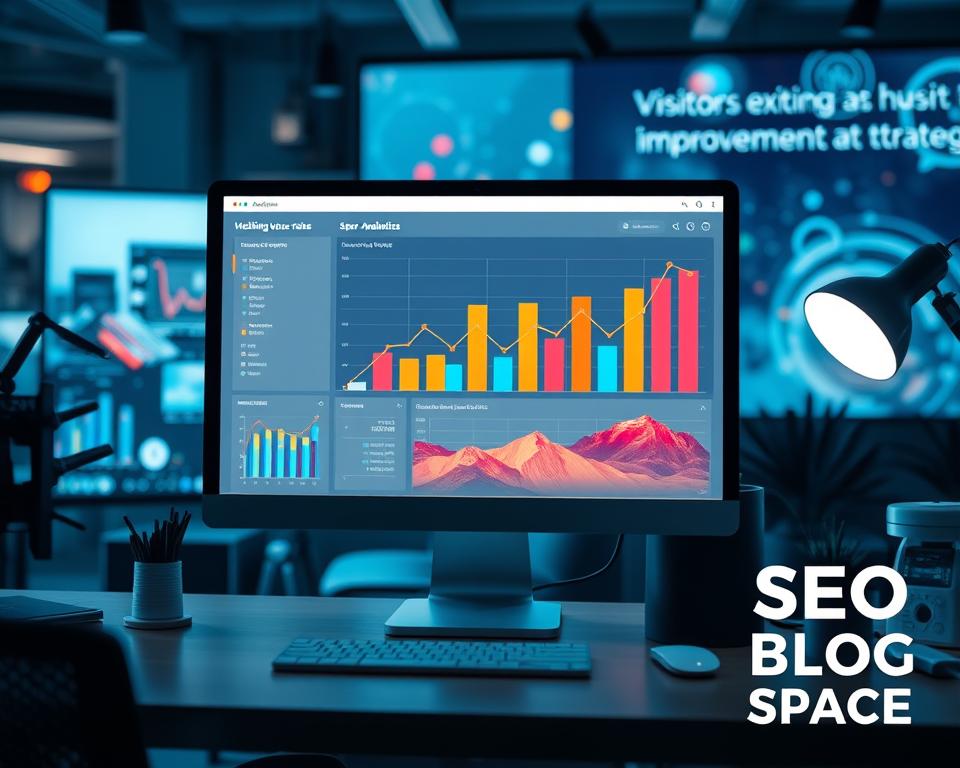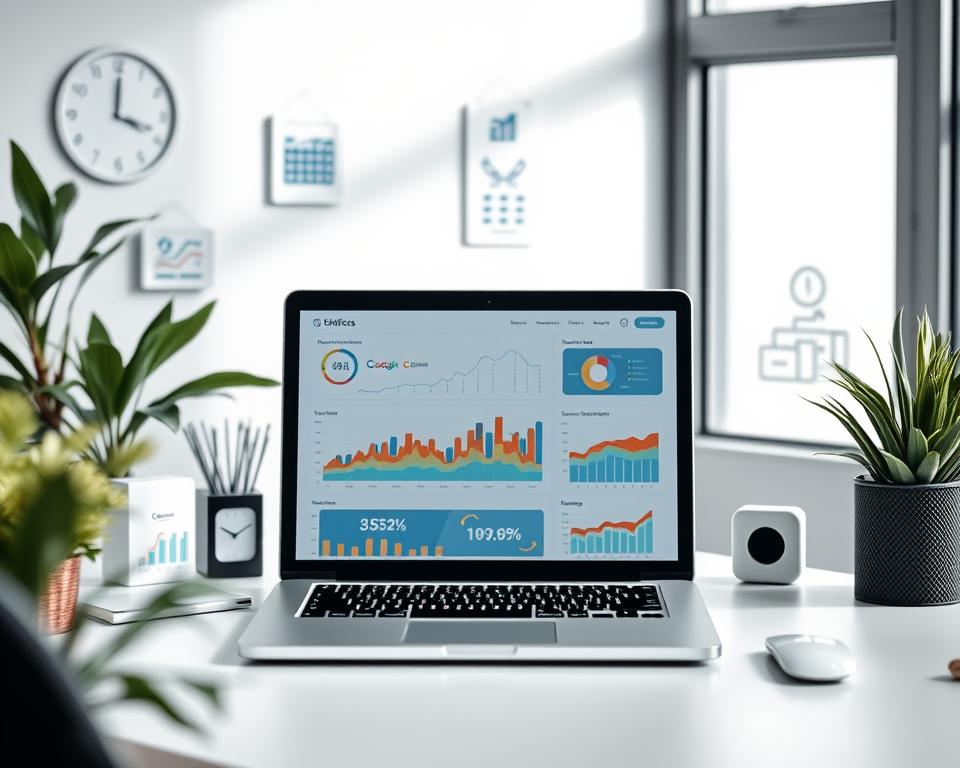To Boost Organic Rankings & Traffic
If you are looking to boost your website’s organic rankings and increase traffic, SEO is an essential strategy to consider. By implementing the right techniques, you can drive organic traffic to your site, improve search engine rankings, and increase web traffic. In this article, we will explore some of the best SEO tips that you can use to optimise your website and achieve long-term success.
Key Takeaways
- Conduct comprehensive keyword research to identify relevant keywords and phrases your target audience is searching for
- Optimise on-page elements such as title tags, meta descriptions, headings, and URL structure
- Create high-quality and engaging content to boost organic rankings and attract more traffic
- Optimise your website for mobile users to improve google rankings and drive organic traffic
- Build high-quality backlinks from reputable websites to improve search engine rankings and drive organic traffic
Conduct a Comprehensive Keyword Research
If you want to improve your website’s visibility on search engines, you must conduct a thorough keyword research. Keyword research is the process of identifying the most relevant and frequently searched words and phrases that your target audience uses to find content related to your business. By using these relevant keywords in your content, you can make your website more visible to search engines and attract organic traffic.
To conduct a comprehensive keyword research, start by brainstorming a list of words and phrases that are relevant to your business. Use tools like Google Keyword Planner, Ahrefs, and SEMrush to identify the search volume and competition level of your chosen keywords. This will help you select keywords that are search engine optimised and suitable for your website.
Once you’ve identified appropriate keywords, optimise your content using these keywords. However, make sure not to overuse them as search engines penalise content that appears spammy and keyword-stuffed. Instead, use them naturally and in a way that aligns with the user’s intent. Doing so will improve your website’s visibility in search results and increase organic traffic, as well as make your website more user-friendly and navigable.
Optimise On-Page Elements
On-page optimisation is a crucial aspect of SEO and involves optimising various elements on your website to improve its visibility in search results and make it more user-friendly. By optimising elements such as title tags, meta descriptions, headings, and URL structure with relevant keywords, you can significantly improve your website’s search engine rankings.
The following are key areas to focus on for effective on-page optimisation:
| Element | Description |
|---|---|
| Title tags | Include relevant keywords in your page titles to improve your website’s visibility in search results. Keep titles under 60 characters to avoid truncation. |
| Meta descriptions | Write a concise and compelling meta description that includes relevant keywords and encourages clicks to your website. Keep descriptions under 155 characters. |
| Headings | Use H1 tags for page titles and H2-H6 tags for headings which follow a clear hierarchy. Include relevant keywords in your headings. |
| URL structure | Create clean and concise URLs that include relevant keywords. Use hyphens to separate words and avoid using numbers or special characters. |
By optimising these on-page elements, you can improve your website’s search engine rankings and make it easier for users to navigate and engage with your content.
Create High-Quality and Engaging Content
If you want your website to stand out, you need to provide your audience with high-quality and engaging content. The type of content you create can have a significant impact on your organic rankings and web traffic.
One way to create high-quality content is by identifying your target audience and understanding their needs. This will help you provide valuable information that your audience is searching for, answering their queries and establishing your website as an authority in your niche.
Another way to improve your content is by using relevant keywords naturally throughout your content. This will help search engines understand what your content is about and improve your website’s visibility in search results.
Remember that when it comes to content, quality is better than quantity. Focus on creating value-driven content that engages your audience and establishes your website as an authority. With high-quality content, you can boost your organic rankings and attract more web traffic.
Optimise for Mobile Users
In the age of mobile, optimising your website for mobile users is essential. Not only does it provide a better user experience, but it can also lead to improved rankings and increased organic traffic. Did you know that about 60% of all Google searches are made from a mobile device? This makes it crucial that your website is mobile-friendly.
The Importance of Mobile Optimisation
Mobile optimisation refers to the process of ensuring your website displays correctly on mobile devices such as smartphones and tablets. This includes making sure that the website loads quickly, all content is visible without having to zoom in or scroll horizontally, and the font size is readable without straining the eyes.
Google has also made it clear that having a mobile-friendly website is a crucial factor in improving your Google rankings. This is because mobile optimisation indicates to Google that your website is user-friendly and provides value to mobile users.
How to Optimise for Mobile Users
Here are some tips on how to optimise your website for mobile users:
- Use a responsive website design that adapts to different screen sizes.
- Optimise your images by compressing them and using appropriate file types.
- Minimise server requests by reducing the number of files and scripts on your website.
- Make sure all content is easily readable without zooming in or scrolling horizontally.
- Eliminate pop-ups and interstitials that can disrupt the user experience on mobile devices.
Build High-Quality Backlinks
Improving your website’s search engine rankings and driving organic traffic heavily rely on high-quality backlinks from reputable websites. Building backlinks from relevant and authoritative sources related to your industry or niche can increase your website’s online credibility and visibility. A single authoritative backlink can be more valuable than hundreds of low-quality ones. Therefore, a backlink building strategy focused on quality, not quantity, is essential.
Focusing on building backlinks naturally can be beneficial. You can employ several tactics for natural backlink building, such as creating high-quality content that targets relevant audiences with engaging information, building relationships with other websites or bloggers in your niche, and continuously monitoring your backlink strategy using a reliable backlink checker to ensure you don’t lose any valuable backlinks.
However, it’s crucial to avoid using black-hat tactics, as search engines quickly detect them, which can lead to search engine penalisation. Instead, hire professional services or develop and implement a white-hat backlink building strategy that adheres to search engine guidelines and yields effective results.
Optimise Site Speed and Performance
Website speed and performance are critical factors in improving your website’s search engine rankings and user experience. A slow-loading website can hinder your SEO efforts and drive users away from your site.
“It takes only a few seconds for users to abandon a website that does not load quickly.”
To optimise your website’s speed, you need to minimise server requests and reduce page size. Use tools like Google’s PageSpeed Insights or GTmetrix to diagnose and pinpoint areas of improvement. These tools identify performance bottlenecks and suggest possible solutions.
Improve Loading Times
To improve loading times, you need to:
- Minimise HTTP requests: Reduce the number of files that need to be loaded and improve website speed. Minimise HTTP requests by compressing images, utilising CSS sprites, and eliminating unnecessary plugins and scripts.
- Enable browser caching: Browsers cache elements like images, CSS, and JavaScript to reduce page loading times. You can leverage this feature to improve your website’s speed by enabling browser caching.
- Minify CSS, HTML, and JavaScript: Minification reduces page size and improves your website’s speed by eliminating whitespace and reducing redundant code. Use tools like CSSNano or HTMLMinifier for optimisation.
Optimise Images
Image optimisation is crucial to ensure your website loads quickly. Use images in the appropriate size and format, compress images to reduce file size, and utilise image lazy loading to improve loading times.
Ensure Mobile Responsiveness
Your website should be optimised for mobile devices, as mobile users comprise a significant portion of your potential audience. A mobile-responsive website enhances user experience, leading to improved organic traffic and search engine rankings.
If you’re unsure about your website’s mobile responsiveness, use Google’s Mobile-Friendly Test to check its suitability.
Utilise Social Media for SEO
Social media optimisation is not only about improving brand awareness and engagement. It can also be a powerful tool for boosting organic rankings and driving traffic to your website.
By promoting your content on social media, you can increase its visibility and attract more users to your website. When people interact with your content by liking, commenting, or sharing it, it generates social signals that search engines consider in their ranking algorithms.
To optimise your social media strategy for SEO, consider these tips:
Create shareable content
The first step is to create high-quality, engaging content that resonates with your target audience. It should be valuable, informative, and shareable, with attention-grabbing headlines and eye-catching visuals.
Promote your content
Once you’ve created your content, make sure to promote it on your social media channels. Share it on your business page, and encourage your employees and followers to do the same. Use relevant hashtags, and tag influencers or other brands that might be interested in your content. You can also leverage social media advertising to expand your reach and promote your content to a broader audience.
Engage with your audience
Social media is all about building relationships with your audience. Engage with your followers by responding to comments, asking for feedback, and encouraging user-generated content. This will not only improve your brand reputation but also generate more social signals that can boost your organic rankings.
Measure your results
Finally, make sure to measure your social media performance to identify areas for improvement. Track your engagement, reach, and referral traffic from social media using Google Analytics or other tools. Use this data to refine your social media strategy and optimise it for better SEO results.
By utilising social media for SEO, you can boost your organic rankings, drive more traffic to your website, and improve your overall online presence.
Monitor and Analyse Performance
Regularly monitoring and analysing your website’s performance is vital for identifying areas that need improvement. Utilise tools like Google Analytics to track metrics such as website traffic, page views, bounce rates, and user behaviour.
By analysing this data, you can gain insights into how users interact with your website and identify areas for improvement. This information will help you make informed decisions and optimise your SEO strategy accordingly, ultimately leading to improved search engine rankings and increased web traffic.
Make sure to track your website’s performance over time to identify trends and patterns. This will help you stay ahead of your competitors and ensure the continued success of your website.
Conclusion
By following these effective SEO tips, you can boost your website’s organic rankings and drive more traffic. From conducting thorough keyword research to optimising on-page elements, creating high-quality content, and utilising social media platforms, there are many ways to improve your website’s visibility in search results.
Remember to monitor and analyse your website’s performance regularly to identify areas for improvement and make informed decisions about your SEO strategy. With time and effort, you can achieve long-term success in the highly competitive digital landscape.
Start implementing these tips today and watch your website’s SEO, rankings, and traffic soar to new heights. Get in touch with us!











